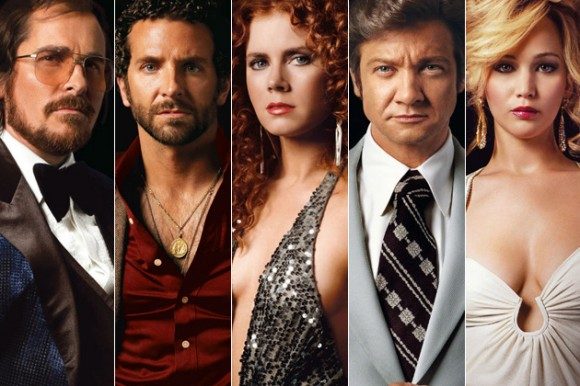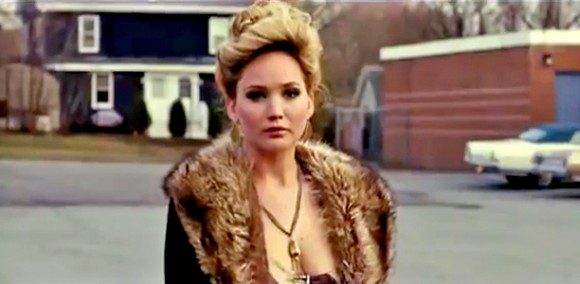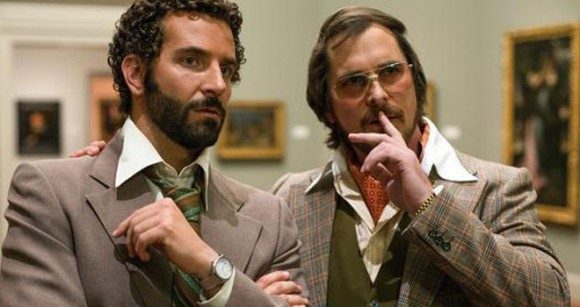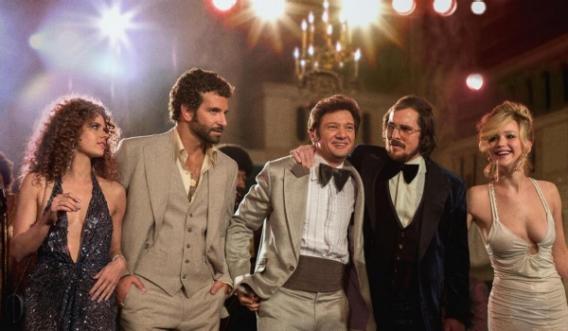“Some of this actually happened.” declares the opening of American Hustle, and this epitomizes the tone of the movie. It’s a subtle runner throughout the film, but American Hustle is a story told in the oral tradition. It’s legend-craft. Mythmaking. And I’m not even talking about any narrator in the film, although it does feature several of its main characters narrating pieces of the story, especially in the first act when we’re just beginning to get to know everyone. No, it’s more about the way it pursues the thing as a whole. We certainly believe that these events might have happened, but there’s a hyperreal sheen around the characters and key moments of the plot. The events portrayed in American Hustle might actually have happened, but like Beowulf or Homer’s Odyssey, or perhaps even more accurately, like your neighbor’s fishing trip, we wonder if it actually happened while also letting go of our cynicism in favor of the enjoyable sensationalism now on display.
American Hustle is, of course, the latest from writer/director David O. Russell, who over the last three years has seen plenty of critical love for his work on Silver Linings Playbook and The Fighter. Most of the key cast from those two movies returns for starring roles here as well(Christian Bale, Amy Adams, Bradley Cooper, and Jennifer Lawrence), joined by the very talented, two time Oscar nominee Jeremy Renner to round out the five headliners. True to their respective pedigrees, all five turn in very strong performances. Much has been made of Matthew McConaughey’s weight loss for Dallas Buyer’s Club (and rightly so), but the difference between the Christian Bale we saw in The Fighter and the Christian Bale on display here is a little stunning. It’s not that Bale is huge, but he’s decidedly pudgy with a pot belly in American Hustle. And he sells it. It’s not a casting choice you could have called when he was busy beating up thugs in the Dark Knight trilogy, but Bale seems completely natural here as an aging, out of shape con man.
It’s Jennifer Lawrence, though, who steals the show in somewhat limited screen time as Bale’s conniving and possibly unbalanced wife Rosalyn. In a film full of good performances, it’s a testament to the 23-year-old’s talent that she A) doesn’t look out of place in the least as the nearly 40-year-old Bale’s wife, B) never seems to be overacting in a role that has her as her as too nosy, too outspoken, passive-aggressive, and often laughable, but can’t become a farce, and C) is able to stand out in a film with so many other talented actors in roles that are no less flashy than her own.
Oh yeah, this is a movie set in the glitz, glam, and hairspray of the ’70s, and this only contributes (beautifully, I might add) to the sense that this whole movie is just beyond the pale of reality. It’s also got one foot, or at least a big toe, planted firmly in the realm of comedy. It’s got meaty dramatic storylines worth following, certainly, but the ’70s New Jersey setting isn’t just passively saying “Look how crazy things used to be.” There are numerous scenes which exist almost explicitly for comic effect. Although this isn’t a aspect of the film its marketing has denied, it surprised me nonetheless, and it was a very pleasant surprise, playing once again into the sense that this is a story told in an oral tradition, where the points of particular note, including some rather ridiculous moments, are the ones which are remembered, and over time played up and embellished without anyone ever really meaning to.
As for the story itself, it’s principally focused on three characters: con man Irving Rosenfeld (Bale), His partner and lover, Sydney Prosser (Adams), and FBI agent Richie DiMaso (Cooper). DiMaso busts an investment scam Irving and Sydney, under the guise of an English aristocrat, are running, but quickly spins a deal to let them walk in exchange for their help catching bigger fish. The entire first act does nothing but set up their (particularly Irving and Sydney’s) characters and the premise that they’re going after Mayor Carmine Polito (Renner).
Structurally, American Hustle is one of the more odd films I’ve seen in a little while. It begins with the familiar scene-followed-by-flashback-building-back-to-original-scene approach, something that seems to me is an overused crutch in Hollywood these days, but American Hustle is peculiar because we’ve arrived back at that initial scene by the end of the first act. So from there what the story really chases is the double relation triangles of Sydney – Irving – Rosalyn and DiMaso – Sydney – Irving, as well as the progressively deeper rabbit hole of cons they must pull off as DiMaso’s eyes get bigger and bigger. The narrative momentum of the story lags pretty badly through the end of the second act and into the beginning of the third, but this is at least partially excusable on the strength of the characters.
Still, it feels like American Hustle ended up being a little bit bigger movie than it should have been. Rumors are that the initial cut of the movie was more than an hour longer than its initial runtime, but it’s possible more could have gone. I’m reminded of the Faulkner quote that good storytelling requires one to “kill your (sic) darlings.” There were some scenes, such as a minor subplot involving the fact that DiMaso has a fiancee, that were funny but served little narrative purpose. Removing some of these could certainly have helped the pacing issue.
There’s also the camera to consider, which for much of the film was alternatively great and uninspired. Russell and DP Linus Sandgren use (though thankfully don’t overuse) a funny little zoom technique to add levity to some of the tenser moments to great effect, but there were also a lot of very basic, and frankly, rather boring, shots which evinced very little forethought.
The Verdict: 4 out of 5
American Hustle is a great date night movie for couples looking for some slightly more sophisticated fare that’s still plenty playful, a generally clever movie that very pleasingly presents itself as a piece of folklore, and another very solid entry from David O. Russell. Jennifer Lawrence is the only true standout in an excellent ensemble, but the performances are universally strong throughout the movie. There are some plot and pacing issues, as well as a couple camera quirks, but this shouldn’t be nearly enough to scare of anyone who was considering seeing this movie.




